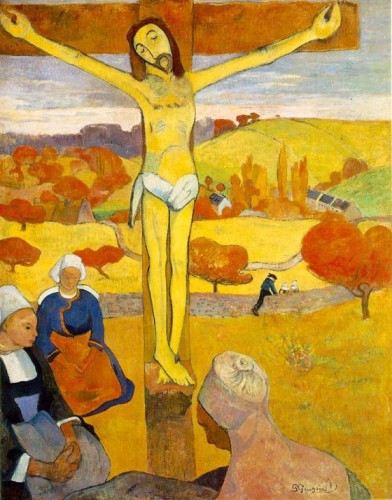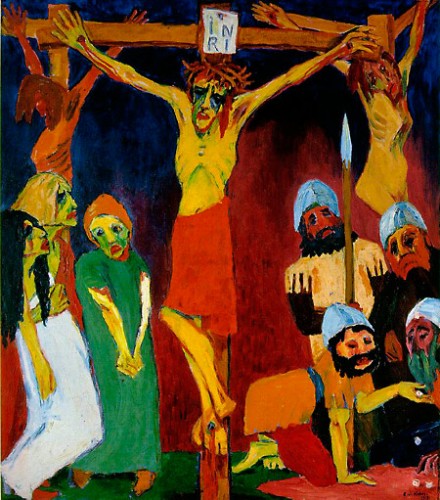
This morning, we are honored to bring you original commentary on the meaning of Good Friday by the inestimable Paul Walker, written as part of a special broadcast of Joseph Haydn’s “The Seven Last Words of Our Saviour On the Cross” on WTJU-Charlottesville, 91.1 FM. For those unfamiliar with the piece, it was commissioned by the Canon of Cadiz in 1786 for the Good Friday service at the Church of Santa Cueva in Cadiz, Spain, and the performance below was recorded in the very same place.
[youtube https://www.youtube.com/watch?v=m7iLwHDmuzs&w=600]
Good Friday is the day of all days for Christians. Yes, there is Christmas and yes, there is Easter. Christmas is about God being with us; God becoming a man to walk along side of us. Easter is about God going before us; Jesus Christ going ahead of us to trample down death, as we say in our Book of Common Prayer Funeral liturgy.
But Good Friday is about God being for us in the slings and arrows of this life. Good Friday is about Jesus Christ dying for our sins, taking our place on the cross. Good Friday is the day Jesus fulfills the demand of God’s law for us, so that we can begin to live in the freedom of grace. In the words of St. Paul, “For our sake He made Him to be sin who knew no sin, that in Him we might become the righteousness of God.” In His final seven words from the cross, Jesus speaks only with words of grace.
“FATHER FORGIVE THEM FOR THEY KNOW NOT WHAT THEY DO”
 There is a resonant sweetness to this movement, and no wonder. These words from our Lord – “Father, forgive them for they know not what they do” are absolving words, comforting words, understanding words. These are the words that have the power to untangle the Gordian knot of our victimizing and victimhood, our deception and arrogance, our bigotry and solipsism, our sin, both mundane and devastating.
There is a resonant sweetness to this movement, and no wonder. These words from our Lord – “Father, forgive them for they know not what they do” are absolving words, comforting words, understanding words. These are the words that have the power to untangle the Gordian knot of our victimizing and victimhood, our deception and arrogance, our bigotry and solipsism, our sin, both mundane and devastating.
But there’s more in these words. Not only do we receive divine forgiveness for what we know we do wrong, we are forgiven for the wrong we do that we are not even aware of or over which we have no control. The subconscious lust and animus that tinge even our best works are met with a kind of blind divine love. In other words, we are totally forgiven not just for what we do, but also for who we are.
Virgil asks, “what region of the earth is not full of our calamities?” No region. And no region for which Christ did not die.
“VERILY I SAY UNTO THEE, TODAY THOU SHALT BE WITH ME IN PARADISE”
Forgiveness means nothing in the abstract. When you have hurt someone and they forgive you, you need them to look you in the eyes and grab your arm. And then you need them to act as if whatever you did wrong didn’t happen. And you need to go do something fun or exciting or happy or creative.
This is what Jesus does in this movement. Although He is Himself is experiencing the extremis of crucifixion, Jesus Christ turns to the criminal on the cross beside him and forgives him. Beneath his crown of thorns, Jesus looks this particular man in the eye and says “Truly I tell you, today you will be with me in paradise.” God’s general forgiveness is made particular in this man, a man who is guilty, a man who transgressed the law. That the man is criminal – the worst of us – is no coincidence. For as St. Paul says, “For by grace you have been saved through faith. And this is not your own doing; it is the gift of God.”
“SON, BEHOLD THY MOTHER! MOTHER, BEHOLD THY SON”
Marilynne Robinson, in her novel Housekeeping writes,
“And while He was on earth He mended families. He gave Lazarus back to his mother, and to the centurion he gave his daughter again. He even restored the severed ear of the soldier who came to arrest him — a fact that allows us to hope the resurrection will reflect a considerable attention to detail.”
His considerable attention to detail is in these moving words: “Son, behold thy mother! Mother, behold thy son.” Jesus speaks to his mother Mary, whose grief must have been overwhelming as she watched her son die on the cross. Standing next to her at the foot of the cross was John, the disciple whom Jesus loved, the youngest of all the disciples. Even at his death, Jesus mended families. As the gospel of John says, “and from that hour the disciple took her into his home.”
“MY GOD, MY GOD, WHY HAST THOU FORSAKEN ME?”
Christians believe that Jesus of Nazareth was fully human and fully God. In His cry of dereliction from the cross, Jesus so totally identifies with us as a fellow sufferer. The words he remembers from Psalm 22 give some kind of voice or shape to his misery and isolation. In these words of forsakenness, Jesus Christ identifies with everyone who has suffered – meaning, everyone.
 Christian Wiman, the editor of Poetry magazine, was diagnosed with a rare and incurable form of blood cancer several years ago. Obviously, he has suffered. Wiman says,
Christian Wiman, the editor of Poetry magazine, was diagnosed with a rare and incurable form of blood cancer several years ago. Obviously, he has suffered. Wiman says,
“I’m a Christian not because of the resurrection…and not because I think Christianity contains more truth than other religions… and not simply because it was the religion in which I was raised (this has been a high barrier). I am a Christian because of that moment on the cross when Jesus, drinking the very dregs of human bitterness, cries out, “My God, my God, why hast Thou forsaken me?”…. The point is that he felt human destitution to its absolute degree; the point is that God is with us, not beyond us, in suffering.
“I THIRST”
Jesus was offered wine two times on the cross. The first he refused and the second he accepted. He refused the first offer of wine because it was mixed with a sedative to ease his pain and suffering. Apparently, Jesus felt the laced wine would in some way compromise the death that He died for our sake.
When he cries, “I thirst”, he is given and accepts a “sponge full of sour wine on a hyssop branch.” Sour wine was wine mixed with vinegar – not a fine wine, not the wine of the wealthy. It was the drink of the common man, cheap wine, probably there at the cross for the soldiers. Is it a surprise that in his last hour, the One who was born in a stable, who ate and drank with sinners, drinks the wine of the poor? Again, as St. Paul says, Jesus “did not count equality with God a thing to be grasped, but emptied himself, by taking the form of a servant, being born in the likeness of men. And being found in human form, he humbled himself by becoming obedient to the point of death, even death on a cross.”
“IT IS FINISHED”
After Jesus drink the sour wine, and right before he gives up his spirit, He cries out “It is finished.” St. Augustine says,
The Maker of man was made man
That the Ruler of Stars might suck at the breast
That the Bread of Life might be hungered
The Fountain, thirst
The Light, sleep
The Way be wearied by the journey
The Truth be accused by false witnesses
The Judge of the Living and the Dead be judged by a mortal judge
The Chastener, be chastised with whips,
The Vine be crowned with thorns,
The Foundation be hung upon a tree
Strength be made weak,
Health be wounded,
Life die.
To suffer these and such undeserved things,
That He might free the undeserving,
For neither did He deserve any evil,
Who for our sakes endured so many evils,
Nor were we deserving of anything good,
We, who through Him, received such good.
“FATHER, INTO THY HANDS I COMMEND MY SPIRIT”
Though he cried “O God, why hast Thou forsaken me?” in the midst of his anguish, Jesus last words are “Father, into thy hands I commend my spirit.” In the end, there is only trust in God. And for us, at the end of the day, there is only trust in God. The end of the day is, of course, the beginning of the night and the dark. In the night and the dark we do not and cannot see or comprehend or control. For us too, there is only trust in God. As our Episcopal Prayer book says, “we put our whole trust in his grace and his love.” Sunday, after all, is Easter Day.

COMMENTS
One response to “The Day of All Days: Reflections on Haydn’s “The Seven Last Words of Our Saviour On The Cross””
Leave a Reply














What an incredible pleasure to wake up to this. The content on this site is amazing. Thank you!